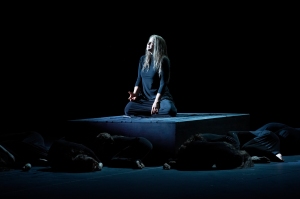The staging of Gluck’s opera Iphigenie en Tauride is a tricky task. As most Greek tragedies, this one too abounds in murder and cruel punishment. It is difficult to present a dark and tragic atmosphere as anything but dark and tragic. But that is the very challenge. On September 28, 2011, I watched the production of this opera owned by Lyric Opera of Chicago, San Francisco Opera, and Royal Opera Covent Garden, (jointly and not severally I guess, I mean the ownership) performed on the stage of the Canadian Opera Company as indicated in the programme.
At the time Christoph Willibald Gluck composed Iphigenie en Tauride, France was a kingdom, and American slaves were granted the right to be enlisted in the civil war known as the American Revolution.
While political régimes and human rights evolved, Gluck’s opera has survived almost 350 years and is still a celebration for the ears, especially when the singers are such stars as Susan Graham and Joseph Kaiser. Mark Doss was a good choice for the role of Thoas, king of Scythia. Mr. Doss cleverly avoided the temptation to please and delivered the required crudeness and repulsiveness of the character at the risk of being initially disliked. I almost fell into this trap. I would like to hear him in another role to have a complete impression.
Ever since I saw heard Joseph Kaiser as Lenski in Salzburg’s production of Eugene Onegin I have looked forward to enjoying his emotionally focused and enchanting voice. It was a pleasure and privilege to hear him live.
It would be unfair not to mention the minor roles of Jacqueline Woodley, Mireille Asselin, Philippe Sly, Robert Pomakov, Ambur Braid and Loren Segal, who contributed to the success of this performance.
Although I may be perceived as an advocate for minimalistic regie-oriented staging, this time I beg to differ. When Thoas, king of Scythia, learned the prophecy that he would die from the hand of a stranger, he instituted a policy that every stranger venturing into his land be killed. (some are still desirous of such immigration policy) He entrusted the task of killing to the gentle maiden Iphigenie, banished to his land by Diana, the goddess of hunting, who saved her from being sacrificially killed by her father. Such a terrible fate demands a shocking visual depiction. Tobias Hoheisel, the set and costume designer, opted for overly subdued, if not cliché, solutions of a plain, dark colour and a somber, void stage. Lighting designers Robert Carsen and Peter Van Praet heavily relied on the shadows. The combination of stage design, costumes and lighting removed the edge of the horrible and unseemly from the fate of Iphigenie and clipped out the potential for the dramatic visual impact warranted by this plot. On the other hand it may be a good choice of opera to seize the opportunity to introduce in safe doses such minimalism to a regie-untamed opera audience.
The best and dramatically most convincing part was a noble struggle between Oreste (Russell Braun)and Pilades (Joseph Kaiser) , each offering his life to save the life of the other. A special mention goes to Russel Braun who, in spite of being indisposed by cold managed to sing as if there was no problem. The same thing happened to Susan Graham and Placido Domingo during this winter live broadcast from the MET. It was during the conversation with Natalie Dessay that we realized that it was really a case of bad cold for each of them. Yet, I don’t know how, they sign as if there is no stuffed nose and aching throat. Remarkable. Singers are fully entitled to cancel the performance and should never hesitate to do so. We ordinary mortals should remind ourselves how often we call a sick day under far less strenuous expectations. Still I tip my hat to those who are brave and ready to risk.
A surprise came from the orchestra under the conductor Pablo Heras-Casado. For the dramatic libretto Mr. Heras-Casado derived a sound more akin to a military march, on occasion jovial and cheerful, but not always in sync with the singing from the stage. The chorus master Sandra Horst, and the choreographer by Philippe Giraudeau compensated a great deal for the discrepancies between the pit and the stage. The lighting came across as underutilized. The reduction of props depleted the potential for creating more dynamics on the stage.
The best visual effect of the stage was the final one, which continued during the curtain bows. The surreal, white, void space surrounding the platform of the slanted stage looked stunning, out-of-this-world. Some singers did not have the best night or enough time to warm up, but the Toronto audience was gracious and greeted all with a generous applause.



